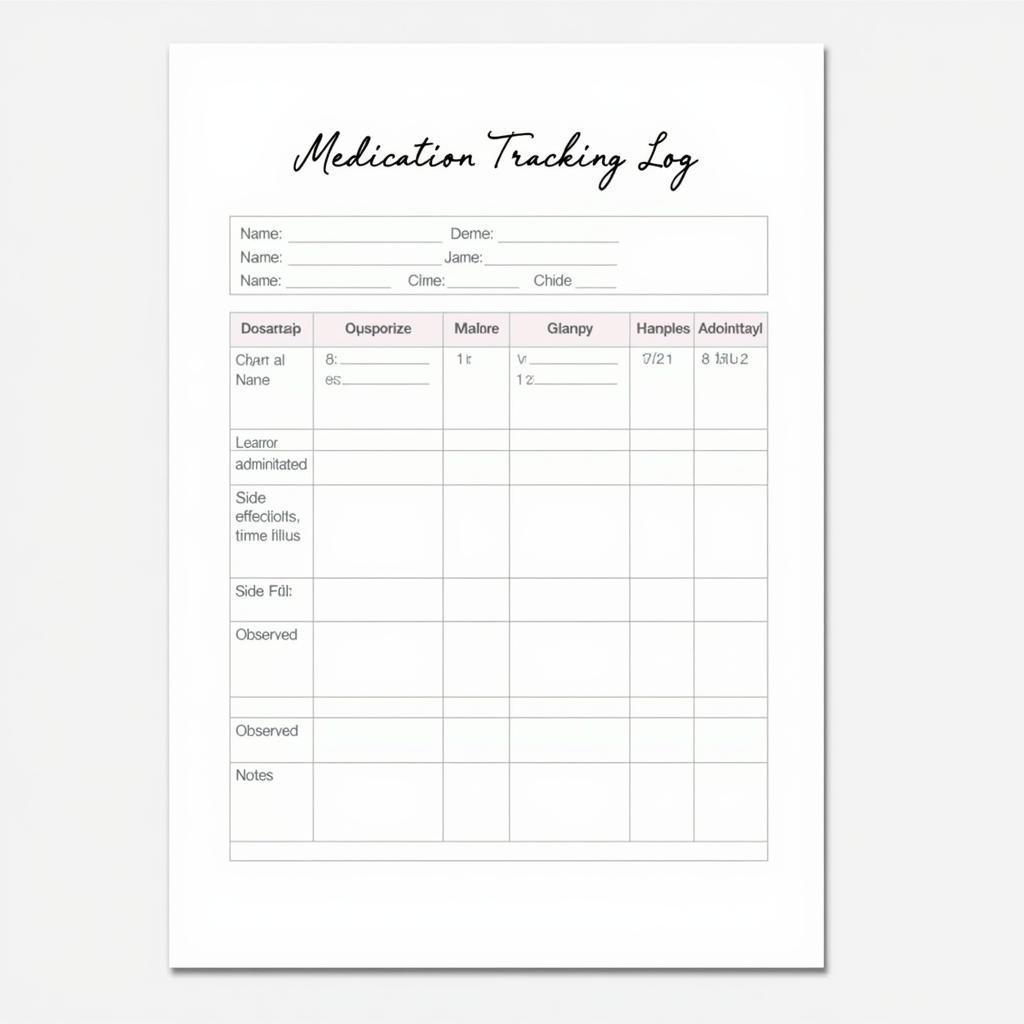The Importance of a Dementia Care & Psychotropic Medication Tracking Tool
Psychotropic medications are often prescribed to individuals with dementia to manage behavioral and psychological symptoms of dementia (BPSD) such as agitation, aggression, anxiety, and hallucinations. While these medications can be beneficial, they also carry the risk of side effects. A dedicated tracking tool helps ensure the responsible and effective use of these medications. It allows for detailed documentation, promoting better communication among the care team and facilitating data-driven decision-making.
This tool also offers invaluable support in navigating the complexities of dementia care. It empowers caregivers to observe trends, identify potential triggers for BPSD, and track the efficacy of non-pharmacological interventions. By meticulously documenting medication usage and behavioral changes, caregivers can provide physicians with crucial information for optimizing treatment plans.
![]() Dementia Care Medication Tracking Log Example
Dementia Care Medication Tracking Log Example
Choosing the Right Dementia Care & Psychotropic Medication Tracking Tool
Selecting the appropriate tracking tool is crucial for maximizing its benefits. Consider the following factors:
- Ease of Use: The tool should be intuitive and easy to navigate, allowing for quick data entry and retrieval.
- Comprehensive Tracking: It should facilitate the recording of all relevant information, including medication name, dosage, administration time, side effects, and behavioral observations.
- Customization Options: The tool should be adaptable to individual patient needs and preferences, allowing for personalized tracking.
- Collaboration Features: Sharing capabilities enable seamless communication among family members, caregivers, and healthcare providers.
- Reporting and Analysis: The ability to generate reports and analyze data provides valuable insights for treatment adjustments and care planning.
Benefits of Utilizing a Tracking Tool in Dementia Care
Using a dementia care & psychotropic medication tracking tool offers numerous advantages:
- Improved Medication Management: Accurate tracking helps prevent medication errors and ensures adherence to prescribed regimens.
- Enhanced Communication: The tool facilitates clear communication between caregivers, family members, and physicians, promoting a collaborative approach to care.
- Reduced Adverse Events: Careful monitoring of side effects allows for timely interventions and adjustments to medication regimens, minimizing potential harm.
- Data-Driven Decision-Making: Tracked data provides valuable insights for evaluating treatment effectiveness and making informed decisions about care.
- Increased Caregiver Confidence: A comprehensive tracking tool empowers caregivers with the information they need to provide the best possible care.
“A well-designed tracking tool is essential for optimizing medication management and improving outcomes in dementia care,” says Dr. Emily Carter, a geriatric psychiatrist with over 20 years of experience. “It empowers caregivers to proactively address potential issues and collaborate effectively with the healthcare team.”
Integrating a Dementia Care & Psychotropic Medication Tracking Tool into Your Routine
Integrating a tracking tool into the daily routine can be seamless:
- Choose a suitable tool: Select a tool that aligns with your needs and preferences.
- Establish a consistent schedule: Designate specific times for data entry to ensure accurate tracking.
- Train all caregivers: Ensure that all individuals involved in the patient’s care understand how to use the tool effectively.
- Regularly review and analyze data: Use the generated reports to identify trends and make informed decisions.
- Communicate with the healthcare team: Share the tracked data with the physician to facilitate collaborative care planning.
“By consistently using a tracking tool, caregivers can provide physicians with valuable data, leading to more personalized and effective treatment plans,” adds Dr. Michael Davis, a certified dementia practitioner.
Conclusion
A dementia care & psychotropic medication tracking tool is an indispensable resource for providing optimal care to individuals with dementia. It empowers caregivers, enhances communication, and promotes data-driven decision-making. By meticulously tracking medication usage and behavioral changes, you can contribute to improved patient outcomes and enhance the overall quality of care.
FAQ
- What are the common side effects of psychotropic medications in dementia?
- Are there non-pharmacological alternatives to managing BPSD?
- How can I find a suitable medication tracking tool for my loved one?
- What information should I include in the tracking log?
- How can I effectively communicate medication concerns with the doctor?
- How often should I review the tracked data?
- Are there any free or low-cost tracking tools available?
Need help with your car diagnostics? Contact us via WhatsApp: +1(641)206-8880, Email: [email protected] or visit us at 910 Cedar Lane, Chicago, IL 60605, USA. Our 24/7 customer service team is ready to assist you.


Leave a Reply